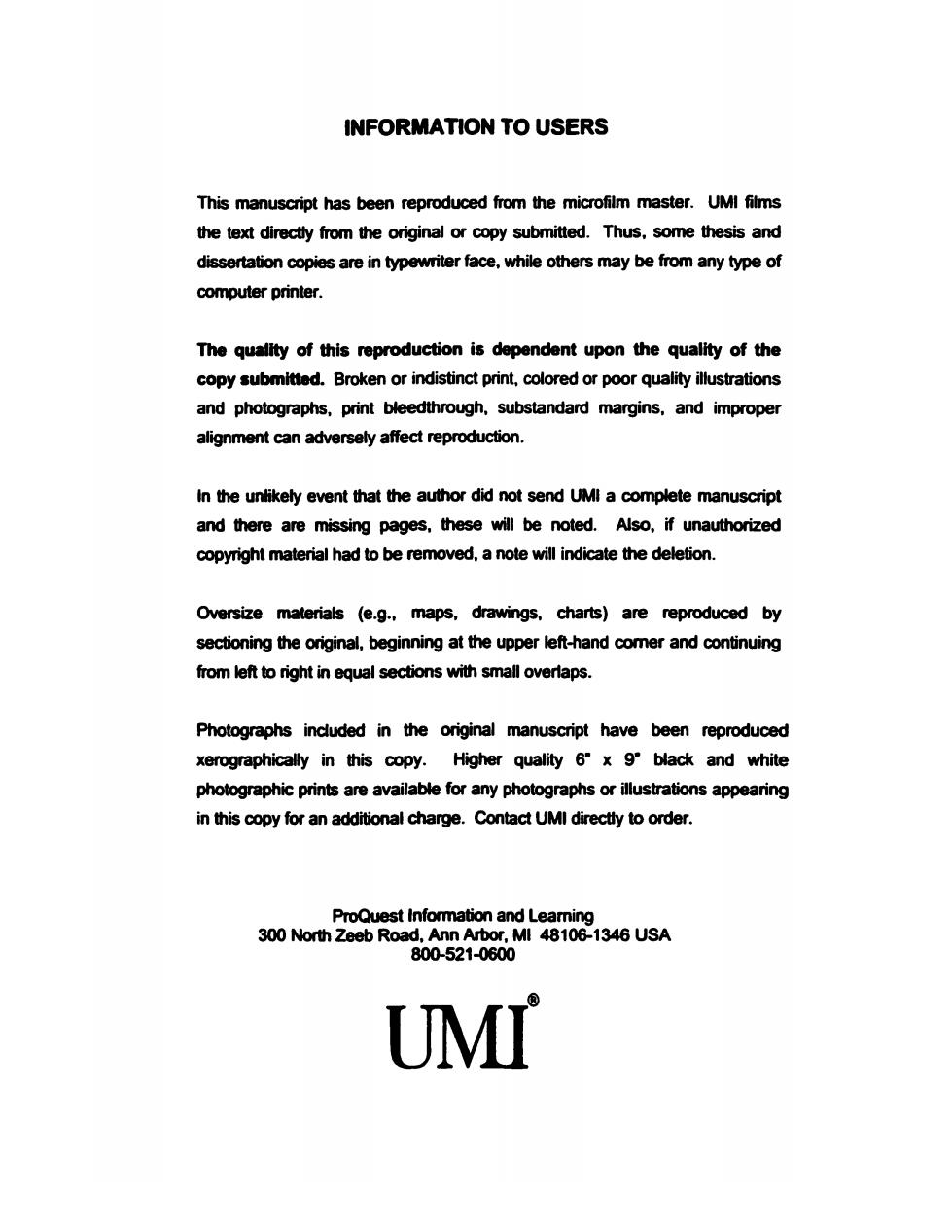
INFORMATION TO USERS This manuscript has been reproduced from the microfilm master.UMI films the text directly from the original or copy submitted.Thus.some thesis and dissertation copies are in typewriter face,while others may be from any type of computer printer. The quallty of this reproduction is dependent upon the quality of the copy submitted.Broken or indistinct print,colored or poor quality illustrations and photographs,print bleedthrough,substandard margins.and improper alignment can adversely affect reproduction. In the unlikely event that the author did not send UMI a complete manuscript and there are missing pages,these will be noted.Also,if unauthorized copyright material had to be removed,a note will indicate the deletion. Oversize materials (e.g.,maps,drawings.charts)are reproduced by sectioning the original,beginning at the upper left-hand comer and continuing from left to right in equal sections with small overlaps. Photographs included in the original manuscript have been reproduced xerographically in this copy.Higher quality 6"x 9"black and white photographic prints are available for any photographs or illustrations appearing in this copy for an additional charge.Contact UMI directly to order. ProQuest Information and Leaming 300 North Zeeb Road,Ann Arbor,MI 48106-1346 USA 800-521-0600 UMI
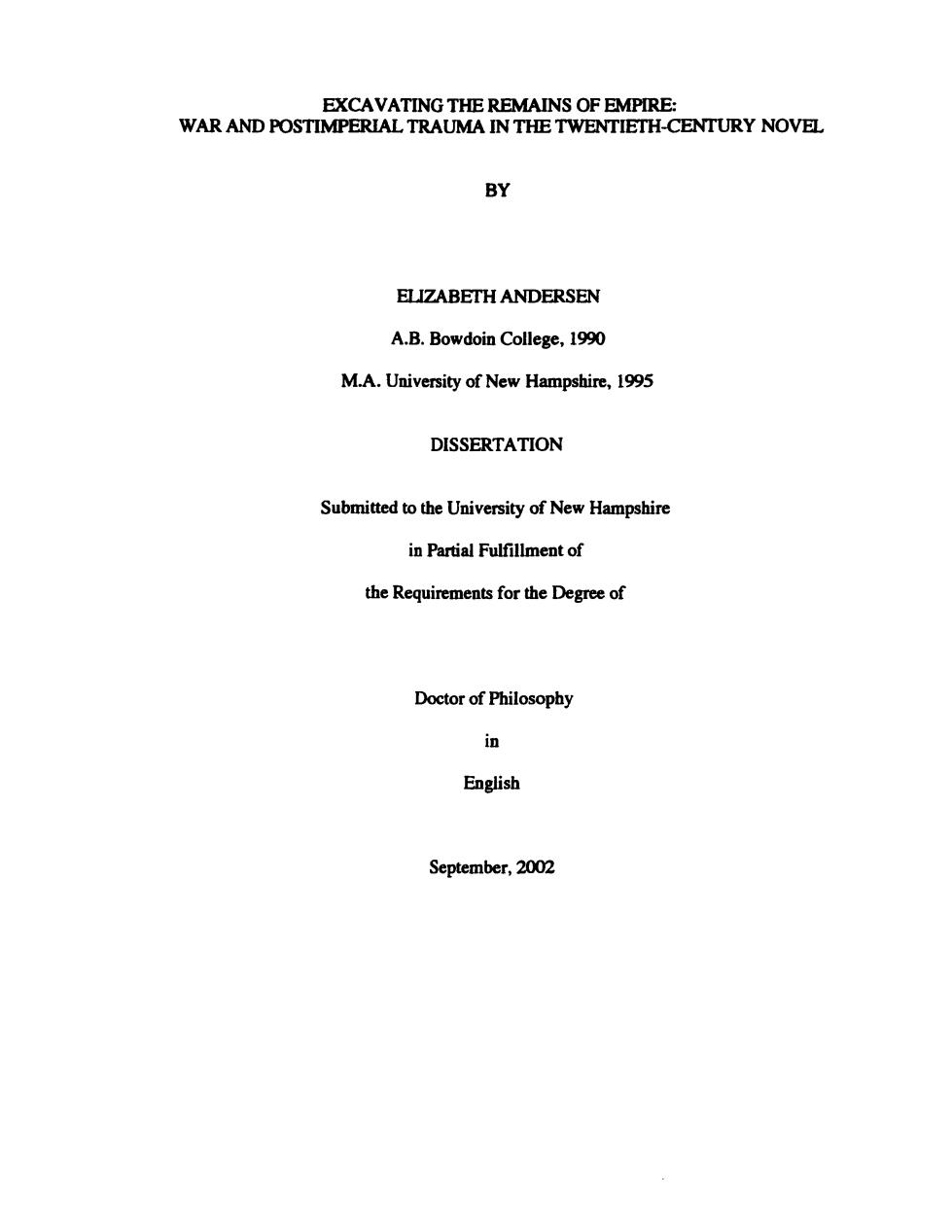
EXCAVATING THE REMAINS OF EMPIRE: WAR AND POSTIMPERIAL TRAUMA IN THE TWENTIETH-CENTURY NOVEL BY ELIZABETH ANDERSEN A.B.Bowdoin College,1990 M.A.University of New Hampshire,1995 DISSERTATION Submitted to the University of New Hampshire in Partial Fulfillment of the Requirements for the Degree of Doctor of Philosophy in English September,2002
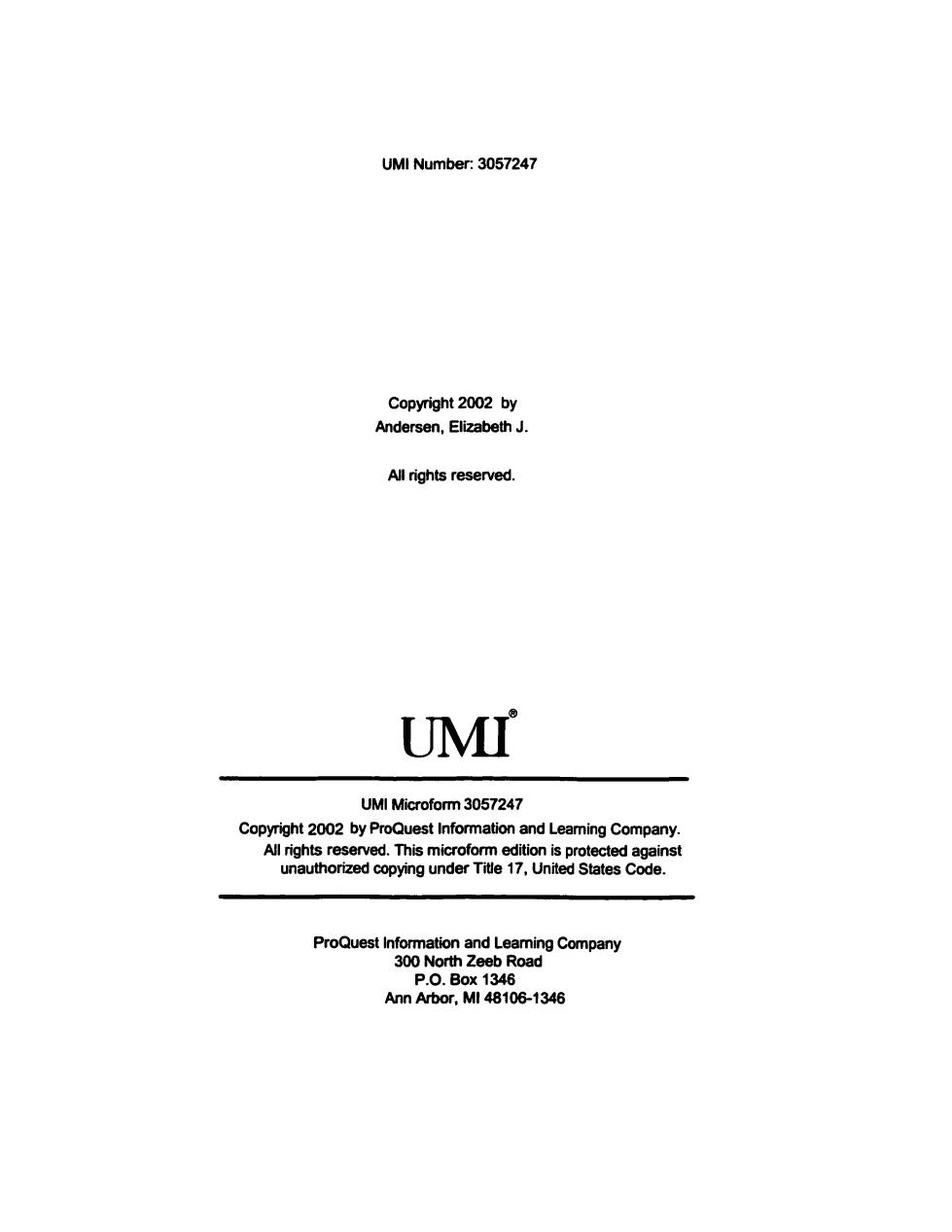
UMI Number:3057247 Copyright 2002 by Andersen,Elizabeth J. All rights reserved. UMI UMI Microform 3057247 Copyright 2002 by ProQuest Information and Leaming Company. All rights reserved.This microform edition is protected against unauthorized copying under Title 17,United States Code. ProQuest Information and Leaming Company 300 North Zeeb Road P.0.Box1346 Ann Arbor,Ml 48106-1346
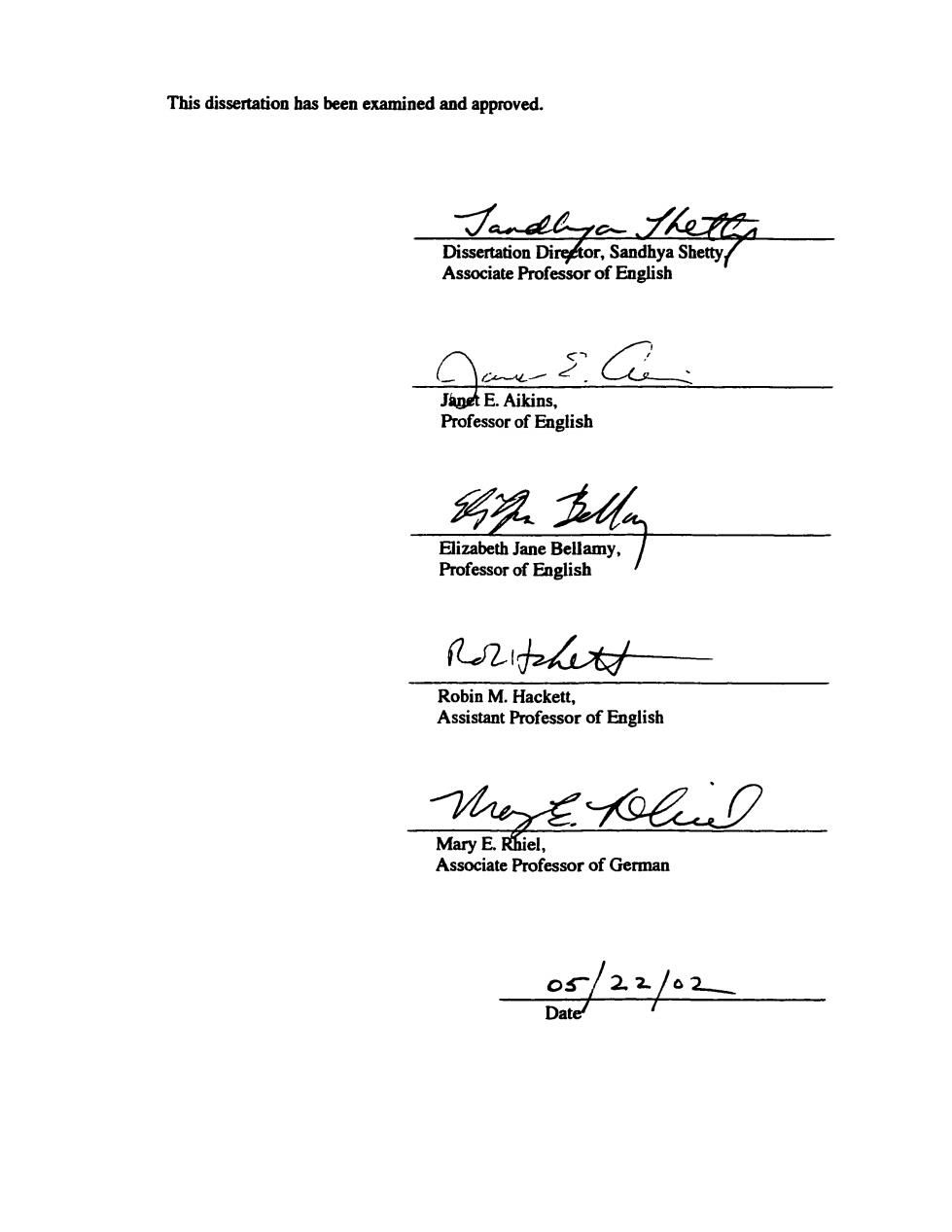
This dissertation has been examined and approved. Dissertation Dire tor,Sandhya Shetty Associate Professor of English 心一 Janet E.Aikins, Professor of English 防只九化 Elizabeth Jane Bellamy, Professor of English 见几中对 Robin M.Hackett, Assistant Professor of English 0☑O Mary E.Rhiel, Associate Professor of German Date 22
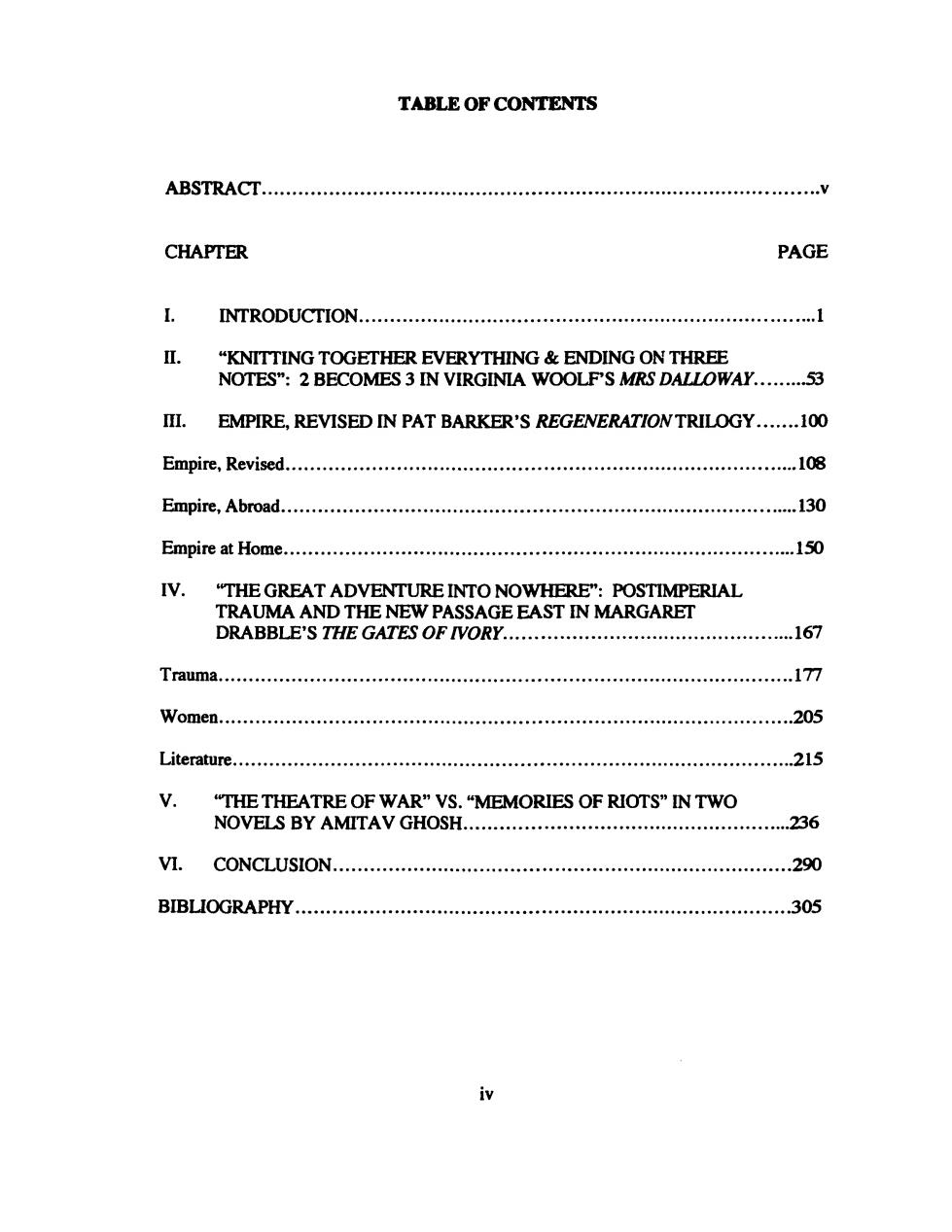
TABLE OF CONTENTS ABSTRACT....... CHAPTER PAGE INTRODUCTION............. Ⅱ. "KNITTING TOGETHER EVERYTHING ENDING ON THREE NOTES":2 BECOMES 3 IN VIRGINIA WOOLF'S MRS DALLOWAY.........53 MI. EMPIRE,REVISED IN PAT BARKER'S REGENERATION TRILOGY.......100 Empire,Revised.....................................108 Empire,Abroad...............................................................................138 H0me444444 IV. "THE GREAT ADVENTURE INTO NOWHERE":POSTIMPERIAL TRAUMA AND THE NEW PASSAGE EAST IN MARGARET DRABBLE'S THE GATES OF IVORY......................................167 Trauma.… ....177 Women.… ..205 Literature.… .215 V. THE THEATRE OF WAR”VS.“MEMORIES OF RIOTS”NTWO NOVELS BY AMITAV GHOSH....36 VI. CONCLUSION............ .290 BIBLIOGRAPHY.... .305 iv
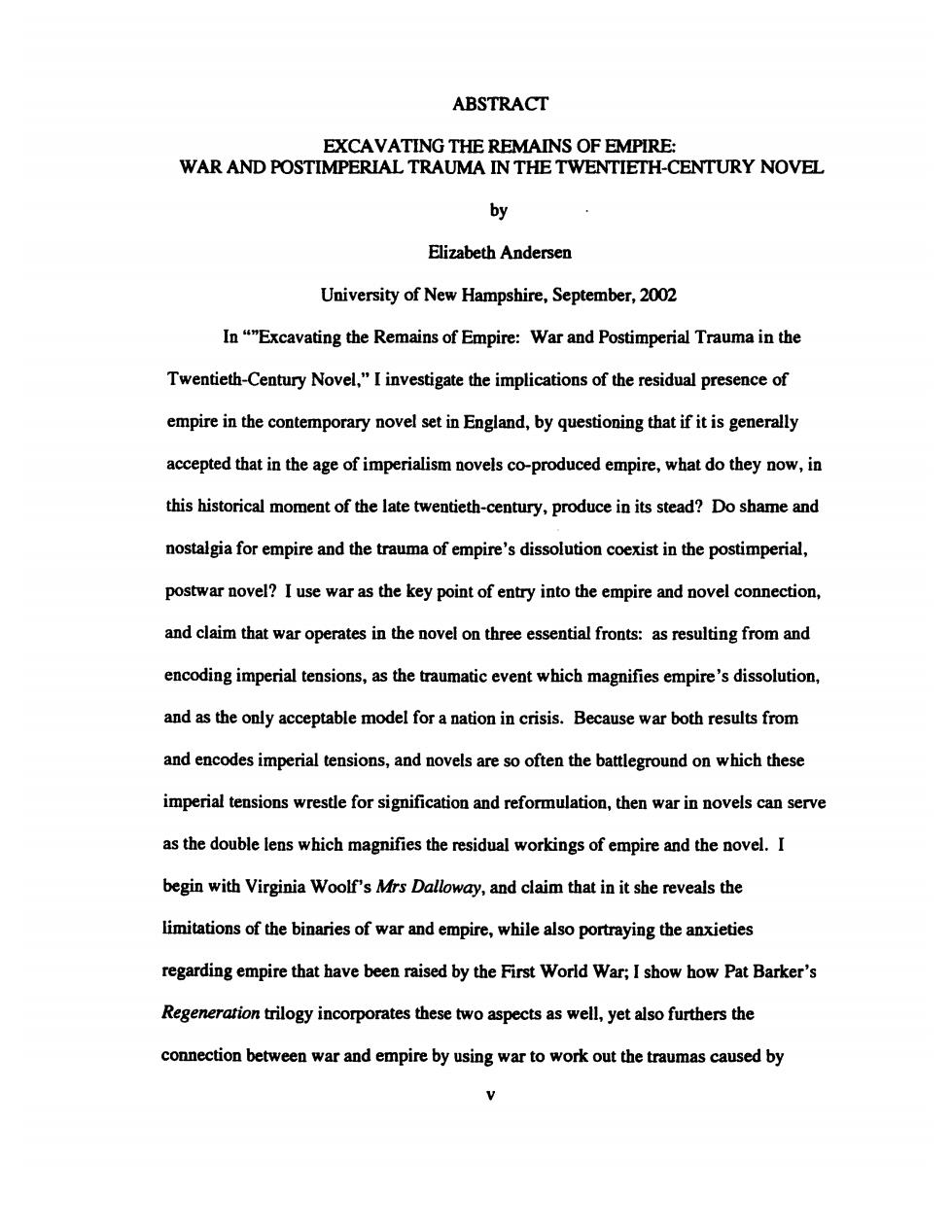
ABSTRACT EXCAVATING THE REMAINS OF EMPIRE: WAR AND POSTIMPERIAL TRAUMA IN THE TWENTIETH-CENTURY NOVEL by Elizabeth Andersen University of New Hampshire,September,2002 In""Excavating the Remains of Empire:War and Postimperial Trauma in the Twentieth-Century Novel,"I investigate the implications of the residual presence of empire in the contemporary novel set in England,by questioning that if it is generally accepted that in the age of imperialism novels co-produced empire,what do they now,in this historical moment of the late twentieth-century,produce in its stead?Do shame and nostalgia for empire and the trauma of empire's dissolution coexist in the postimperial, postwar novel?I use war as the key point of entry into the empire and novel connection, and claim that war operates in the novel on three essential fronts:as resulting from and encoding imperial tensions,as the traumatic event which magnifies empire's dissolution, and as the only acceptable model for a nation in crisis.Because war both results from and encodes imperial tensions,and novels are so often the battleground on which these imperial tensions wrestle for signification and reformulation,then war in novels can serve as the double lens which magnifies the residual workings of empire and the novel.I begin with Virginia Woolf's Mrs Dalloway,and claim that in it she reveals the limitations of the binaries of war and empire,while also portraying the anxieties regarding empire that have been raised by the First World War;I show how Pat Barker's Regeneration trilogy incorporates these two aspects as well,yet also furthers the connection between war and empire by using war to work out the traumas caused by
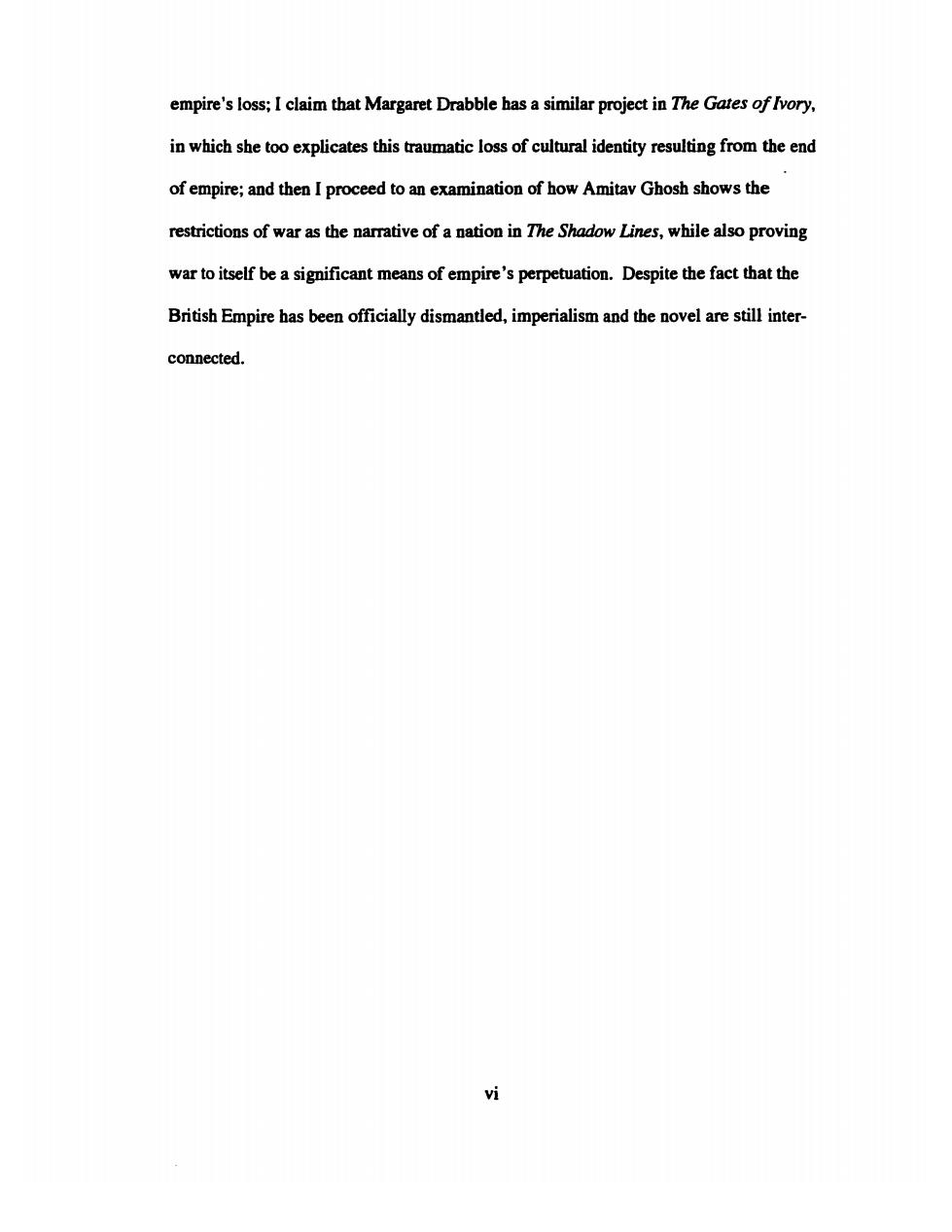
empire's loss;I claim that Margaret Drabble has a similar project in The Gates of /vory, in which she too explicates this traumatic loss of cultural identity resulting from the end of empire;and then I proceed to an examination of how Amitav Ghosh shows the restrictions of war as the narrative of a nation in The Shadow Lines,while also proving war to itself be a significant means of empire's perpetuation.Despite the fact that the British Empire has been officially dismantled,imperialism and the novel are still inter- connected. vi
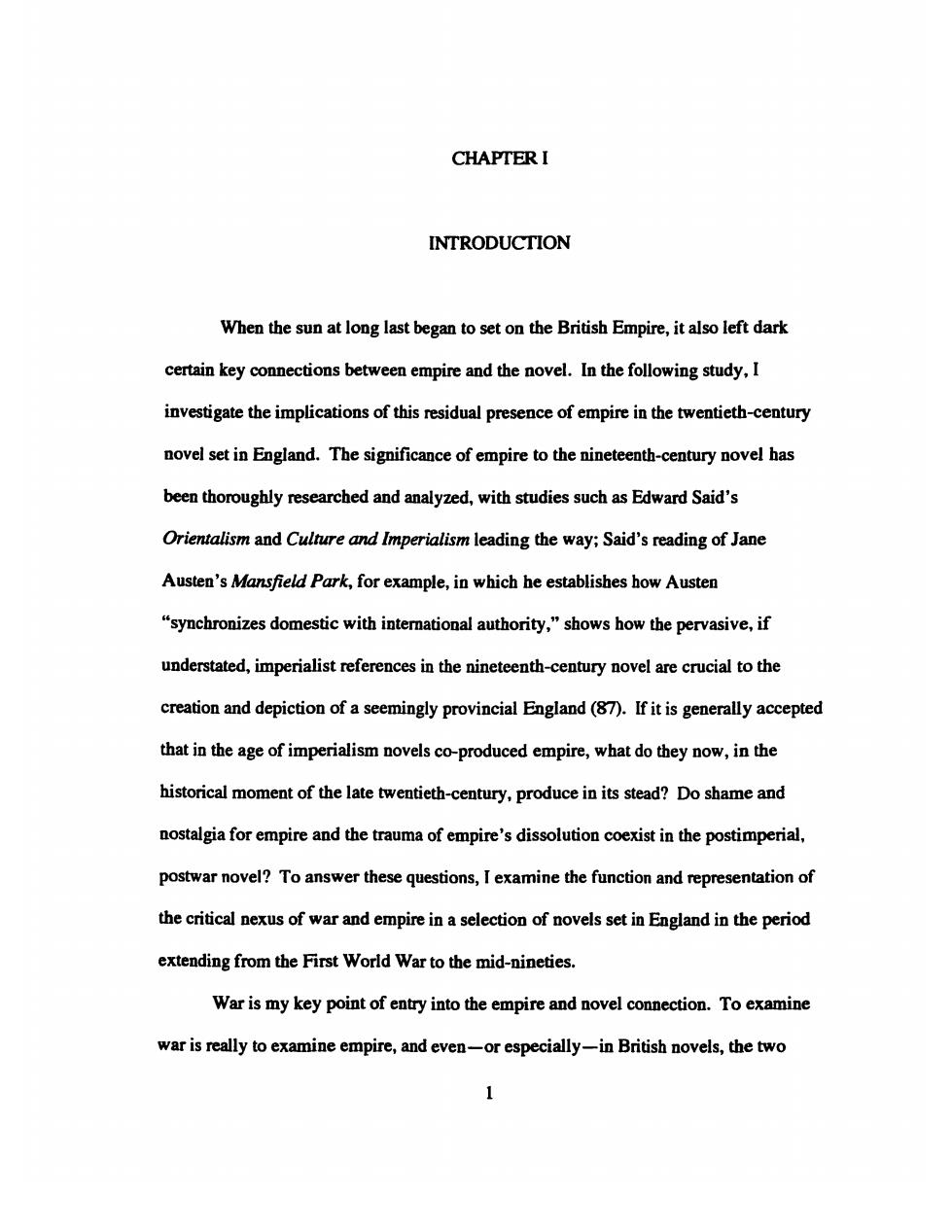
CHAPTER I INTRODUCTION When the sun at long last began to set on the British Empire,it also left dark certain key connections between empire and the novel.In the following study,I investigate the implications of this residual presence of empire in the twentieth-century novel set in England.The significance of empire to the nineteenth-century novel has been thoroughly researched and analyzed,with studies such as Edward Said's Orientalism and Culture and Imperialism leading the way;Said's reading of Jane Austen's Mansfield Park,for example,in which he establishes how Austen "synchronizes domestic with international authority,"shows how the pervasive,if understated,imperialist references in the nineteenth-century novel are crucial to the creation and depiction of a seemingly provincial England(87).If it is generally accepted that in the age of imperialism novels co-produced empire,what do they now,in the historical moment of the late twentieth-century,produce in its stead?Do shame and nostalgia for empire and the trauma of empire's dissolution coexist in the postimperial, postwar novel?To answer these questions,I examine the function and representation of the critical nexus of war and empire in a selection of novels set in England in the period extending from the First World War to the mid-nineties. War is my key point of entry into the empire and novel connection.To examine war is really to examine empire,and even-or especially-in British novels,the two 1
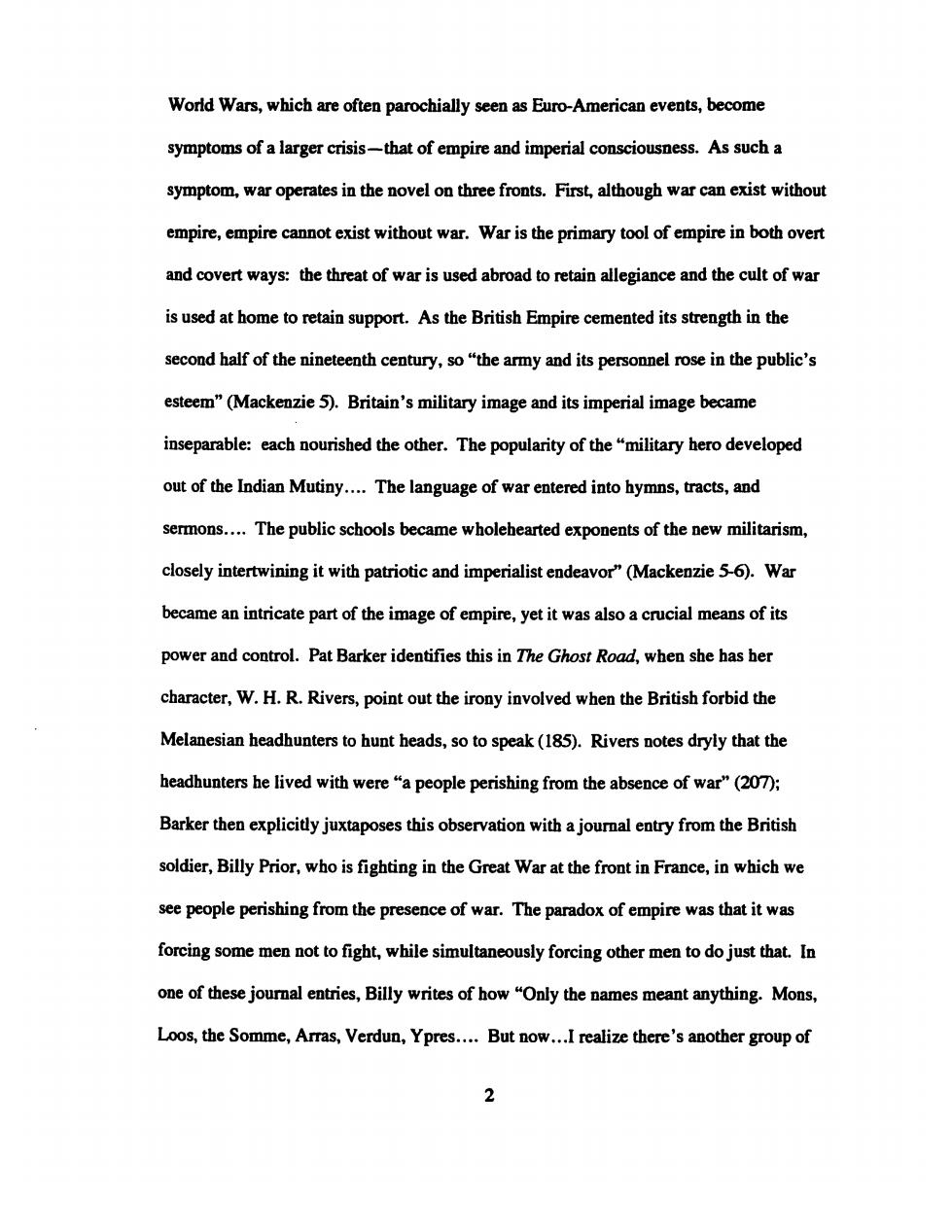
World Wars,which are often parochially seen as Euro-American events,become symptoms of a larger crisis-that of empire and imperial consciousness.As such a symptom,war operates in the novel on three fronts.First,although war can exist without empire,empire cannot exist without war.War is the primary tool of empire in both overt and covert ways:the threat of war is used abroad to retain allegiance and the cult of war is used at home to retain support.As the British Empire cemented its strength in the second half of the nineteenth century,so "the army and its personnel rose in the public's esteem"(Mackenzie 5).Britain's military image and its imperial image became inseparable:each nourished the other.The popularity of the"military hero developed out of the Indian Mutiny....The language of war entered into hymns,tracts,and sermons....The public schools became wholehearted exponents of the new militarism closely intertwining it with patriotic and imperialist endeavor"(Mackenzie 5-6).War became an intricate part of the image of empire,yet it was also a crucial means of its power and control.Pat Barker identifies this in The Ghost Road,when she has her character,W.H.R.Rivers,point out the irony involved when the British forbid the Melanesian headhunters to hunt heads,so to speak(185).Rivers notes dryly that the headhunters he lived with were"a people perishing from the absence of war"(207); Barker then explicitly juxtaposes this observation with a journal entry from the British soldier,Billy Prior,who is fighting in the Great War at the front in France,in which we see people perishing from the presence of war.The paradox of empire was that it was forcing some men not to fight,while simultaneously forcing other men to do just that.In one of these journal entries,Billy writes of how "Only the names meant anything.Mons, Loos,the Somme,Arras,Verdun,Ypres....But now...I realize there's another group of 2
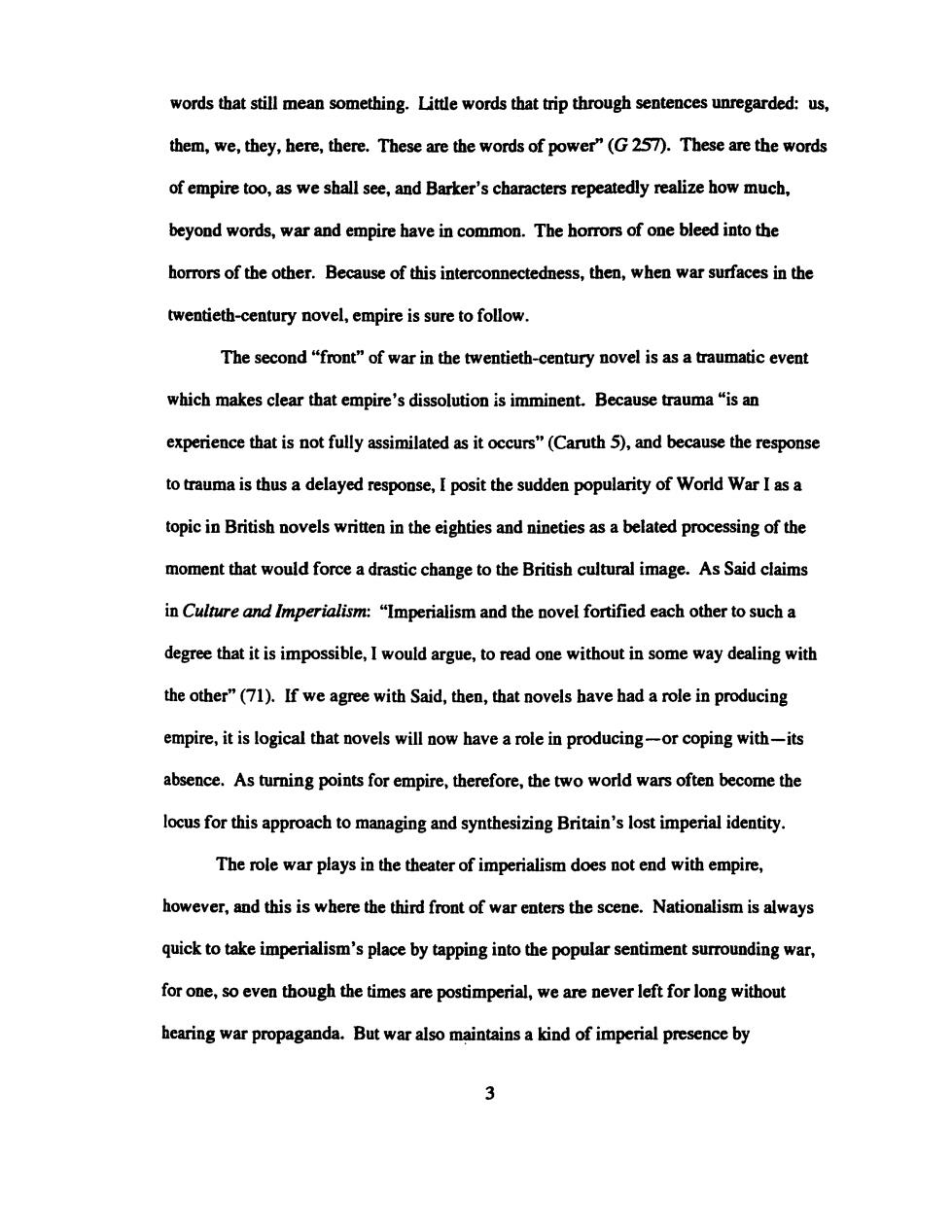
words that still mean something.Little words that trip through sentences unregarded:us, them,we,they,here,there.These are the words of power"(G 257).These are the words of empire too,as we shall see,and Barker's characters repeatedly realize how much, beyond words,war and empire have in common.The horrors of one bleed into the horrors of the other.Because of this interconnectedness,then,when war surfaces in the twentieth-century novel,empire is sure to follow. The second "front"of war in the twentieth-century novel is as a traumatic event which makes clear that empire's dissolution is imminent.Because trauma "is an experience that is not fully assimilated as it occurs"(Caruth 5),and because the response to trauma is thus a delayed response,I posit the sudden popularity of World War I as a topic in British novels written in the eighties and nineties as a belated processing of the moment that would force a drastic change to the British cultural image.As Said claims in Culture and Imperialism:"Imperialism and the novel fortified each other to such a degree that it is impossible,I would argue,to read one without in some way dealing with the other"(71).If we agree with Said,then,that novels have had a role in producing empire,it is logical that novels will now have a role in producing-or coping with-its absence.As turning points for empire,therefore,the two world wars often become the locus for this approach to managing and synthesizing Britain's lost imperial identity. The role war plays in the theater of imperialism does not end with empire, however,and this is where the third front of war enters the scene.Nationalism is always quick to take imperialism's place by tapping into the popular sentiment surrounding war, for one,so even though the times are postimperial,we are never left for long without hearing war propaganda.But war also maintains a kind of imperial presence by 3